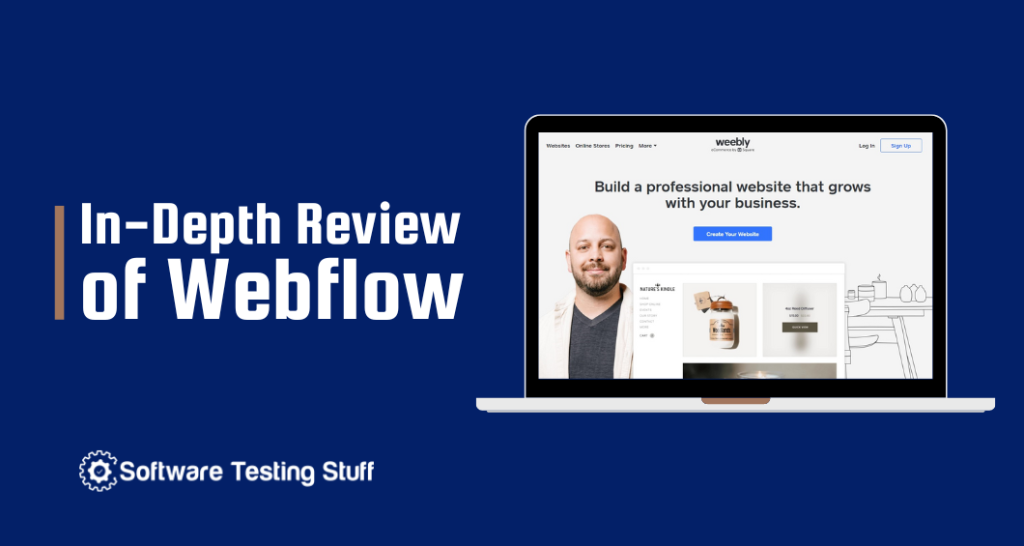Webflow is a modern tool for building websites that are gaining popularity fast. It’s unique because you can design complex websites without needing to code. This makes it popular among people who design websites, like graphic designers and small business owners.
However, Webflow is user-friendly and lets you customize a lot, which is why over 2 million people use it. Knowing about Webflow is essential if you’re into web design or running a website. It’s a tool that’s changing how people make websites.
In this article, we’ll dive into what makes Webflow so useful. We’ll explore its features and why so many people choose it for their web projects.
Quick Overview of Webflow
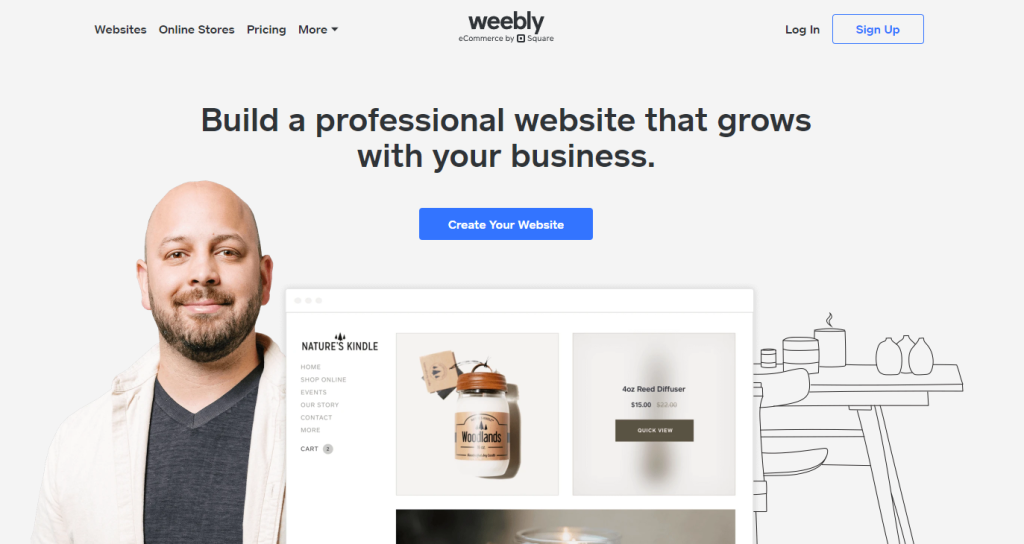
Webflow stands as a groundbreaking tool in the web design and development landscape. It’s a unique platform that merges the worlds of design and development, offering a visual interface for creating websites. Webflow is distinctive for enabling designers to craft responsive, custom control panel based websites without writing code democratizing website creation.
However, Webflow is more than just a website builder; it’s an all-in-one design platform that provides a comprehensive suite of tools for web creation. From website design to launching a site, it covers every aspect.
Users can design, build, and launch dynamic, responsive websites visually, while Webflow automatically generates clean, semantic code. It’s also known for its seamless integrations with various tools and platforms, enhancing its functionality.
Key Features of Webflow
The important step of Webflow Review 2023 is letting you know about its features. Webflow’s key features, encompassing everything from visual editing to e-commerce integration, make it an all-encompassing platform suitable for a broad spectrum of web development projects.
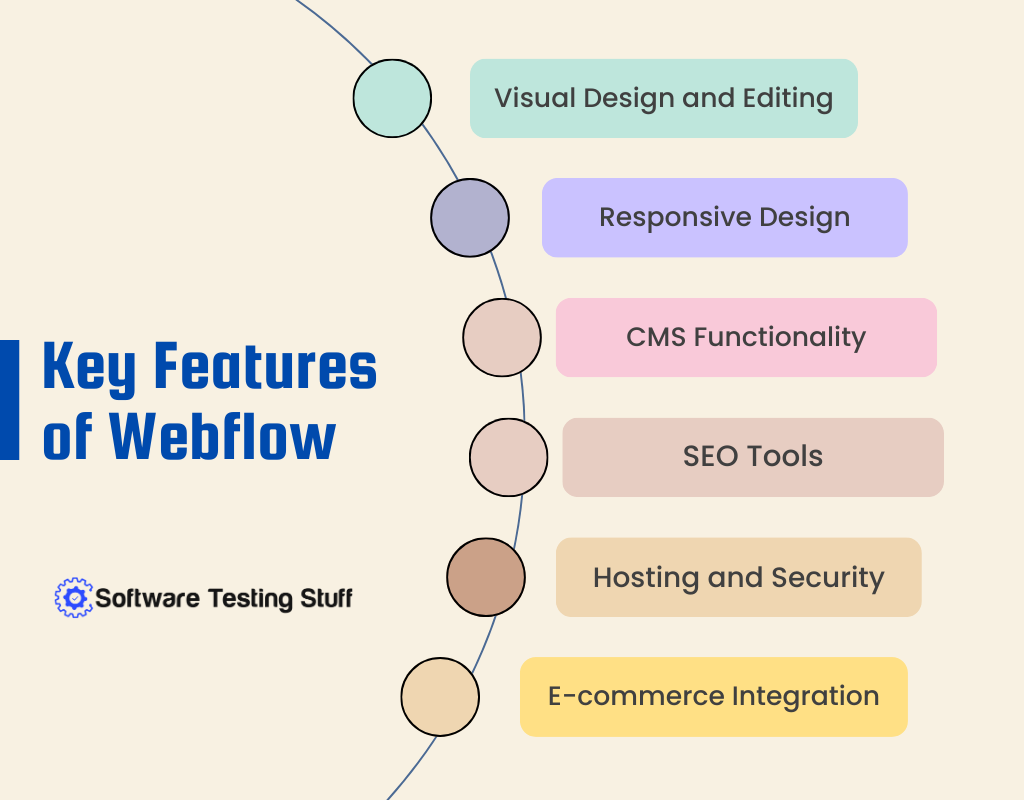
Visual Design and Editing
Webflow revolutionizes website design through its visual editing tools. Users can design in real-time, seeing immediate visual feedback. This feature eliminates the guesswork often associated with coding, making design more intuitive and efficient.
Responsive Design
With Webflow, creating responsive websites is effortless. The platform automatically scales your design for different devices, ensuring your site looks great on desktops, tablets, and smartphones.
CMS Functionality
The CMS in Webflow is powerful yet user-friendly. CMS Webflow reviews allow designers to structure content in a way that’s visually editable and easy for clients to manage. This CMS simplifies updating and adding content without needing a developer.
SEO Tools
Webflow comes equipped with integrated SEO tools. These tools optimize websites for search engines from the editor, improving visibility and reach.
Hosting and Security
Webflow’s hosting is fast, reliable, and secure. The platform offers enterprise-grade hosting solutions, ensuring that websites are fast and safe from threats.
E-commerce Integration
For online stores, Webflow’s e-commerce integration offers an end-to-end solution. It provides customizable templates and shopping cart functionality alongside payment processing features.
This integration makes setting up and managing an online store straightforward and efficient. Backend development for Webflow review is also essential.
Pros of Webflow
- Intuitive visual interface, ideal for non-coders.
- Extensive customization without needing to code.
- Responsive design adapts to any device easily.
- Built-in SEO tools for better search ranking.
- Exportable code for additional development flexibility.
Cons of Webflow
- The steeper learning curve for complete beginners.
- Higher pricing compared to basic tools.
Webflow User Experience
Webflow has redefined the user experience in web design and development. Its intuitive, code-free platform caters to both seasoned designers and beginners.
However, Webflow’s commitment to a seamless user experience is evident in every platform aspect, from design to deployment. Users of Webflow often highlight several key experiences that set it apart.
Intuitive Visual Editor
The visual editor in Webflow is a standout feature. Users enjoy the drag-and-drop interface, making web design as straightforward as creating a document. This visual approach removes the complexity often associated with web development.
Responsive Design Capabilities
Users love Webflow’s responsive design capabilities. The platform makes creating websites that look great on any device simple. This responsiveness is crucial in today’s mobile-first world.
CMS Flexibility
Webflow’s CMS is another highlight. Users appreciate how it simplifies content management without sacrificing design flexibility. It allows easy content updates and management, even for users with no technical background.
E-commerce Functionality
For those building online stores, Webflow’s e-commerce tools are highly praised. The platform provides an easy-to-use solution for creating and managing online shops, enhancing the e-commerce experience.
Learning Resources and Community
Webflow’s extensive learning resources and active community are highly valued. Users benefit from many tutorials, forums, and documentation, making learning Webflow an engaging experience.
Webflow Support for Users
Webflow’s commitment to user support is evident in its comprehensive and multifaceted approach. Understanding that effective support is key to user success, Webflow offers a range of resources and services designed to assist users at every step of their web development journey.
Responsive Customer Service
Webflow’s customer service stands out for its responsiveness and efficiency. Users can expect quick and helpful responses to their queries, ensuring minimal disruption to their workflow. This dedicated support is a cornerstone of Webflow’s commitment to user satisfaction.
Extensive Knowledge Base
The knowledge base is a treasure trove of information. It includes detailed articles, tutorials, and guides, covering everything from basic functions to advanced features. This resource is invaluable for users looking to self-educate and solve problems independently.
Community Forums
Webflow’s community forums are vibrant and supportive. Here, users can engage with fellow Webflow enthusiasts, exchange ideas, seek advice, and share their experiences. This peer-to-peer support system enhances the platform’s overall learning and development experience.
Webinars and Educational Content
Regular webinars and educational content provided by Webflow keep users up-to-date with the latest trends and features. These sessions are informative and provide practical insights into using Webflow effectively.
Regular Platform Updates
Webflow is committed to continuous improvement, regularly updating the platform with new features, enhancements, and bug fixes. These updates ensure users can access the latest tools and functionalities, enhancing their web design and development process.
Design and Development Resources
Webflow offers many design and development resources, including customizable templates, design tools, and detailed integration guides.
These resources help users maximize the potential of the Webflow platform, enabling them to create more dynamic and practical websites.
Webflow Pricing
This table provides a clear overview of the various features and pricing options for each Webflow plan. It will help potential users make an informed decision based on their specific needs.
| Features | Starter | Basic | CMS | Business | Enterprise |
| Pricing (Monthly) | Free | $14 | $23 | $39 | Contact us |
| Publishing | Webflow.io domain | Custom domain | Custom domain | Custom domain | Contact us |
| Static Pages | 2 | 100 | 100 | 100 | Custom |
| CMS Items | 50 | 0 | 2,000 | 10,000 | Custom |
| Form Submissions | 50 lifetime | 500 per month | 1,000 per month | 2,500 per month | Custom |
| Traffic | Limited | Moderate | Generous | Expanded | Custom |
| Bandwidth | 1 GB | 50 GB | 200 GB | 400 GB | Custom |
| Visitors | 1k | 250k | 250k | 300k | Custom |
| Speeds | Blazing fast | Blazing fast | Blazing fast | Blazing fast | Custom |
Our Review: Is Webflow the Right Host for Your Business?
After spending considerable time exploring Webflow, I’ve found it to be a uniquely powerful web design and development platform. Its standout feature is the visual design interface, which allows for intricate website creation without needing to delve into coding.
This is a game-changer, especially for designers who want to bring their ideas to life without technical barriers. Webflow’s hosting reliability and performance are impressive, ensuring that websites are not just beautiful but also function smoothly.
However, through our honest Webflow review, you will get to know that there may be better fits for some. Its pricing, while competitive, can be steep for small businesses or individual users.
Also, the learning curve can be challenging for absolute beginners. Overall, if you’re looking for a blend of design freedom, high-end functionality, and robust hosting, Webflow is definitely worth considering.
Best Alternatives of Webflow
Webflow stands out for its unique capabilities in web design and hosting. But there are other options, especially if you’re looking for specific features or pricing structures. Each alternative offers its own benefits.
Let’s explore some of the best alternatives to Webflow that could align more closely with your business requirements.
1. Dorik
Dorik is a user-friendly web building platform that allows individuals and businesses to create websites without extensive coding knowledge. It uses a simple drag-and-drop interface. Thus, it becomes accessible for users of all skill levels.
The platform is known for its minimalist approach, providing a clean and straightforward way to design and launch websites. Key benefits of Dorik include affordability, ease of use, and a range of customizable templates. It’s trendy among small businesses and freelancers for its cost-effectiveness and simplicity.
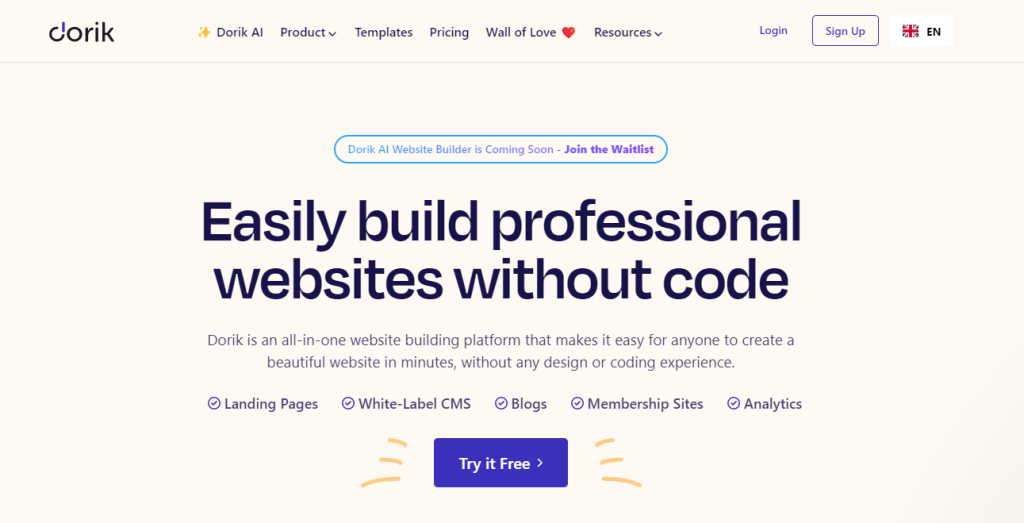
Now, let’s compare Dorik with Webflow in terms of features:
| Feature | Dorik | Webflow |
| Intuitive Drag-and-Drop Interface | Yes | Yes |
| Responsive Design | Yes | Yes |
| E-commerce Integration | Limited | Yes |
| CMS Functionality | Basic | Advanced |
| SEO Tools | Basic | Advanced |
| Custom Code Integration | Limited | Yes |
2. Wix
Wix is a prominent web development platform that enables users to create websites using a drag-and-drop interface. However, Wix hosts over 200 million websites, indicating its popularity and widespread adoption.
It’s designed for users who lack coding expertise. Also, it offers a range of customizable templates and design tools. Wix’s functionality extends to e-commerce, online marketing, and SEO.
A key benefit of Wix is its user-friendly interface, making website creation accessible to everyone.
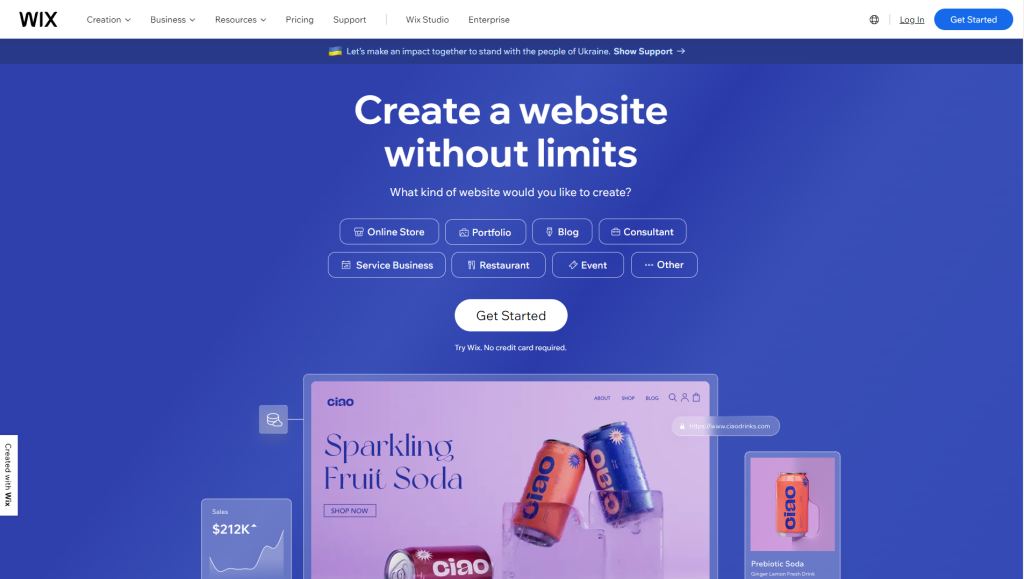
Now, let’s compare Wix and Webflow:
| Feature | Wix | Webflow |
| Drag-and-Drop Interface | Yes | Yes |
| Template Variety | Extensive | Extensive |
| Custom Code Integration | Limited | Yes |
| CMS Functionality | Basic | Advanced |
| SEO Tools | Basic | Advanced |
| E-commerce Integration | Yes | Yes |
3. Squarespace
Squarespace is a unique website building and hosting platform. It is known for its sleek design templates and user-friendly interface. However, Squarespace hosted millions of websites, highlighting its widespread popularity and effectiveness.
It allows users, especially small business owners, artists, and bloggers, to create professional-looking websites without extensive coding skills. Key features include various customizable templates, drag-and-drop editing, and built-in tools for SEO, e-commerce, and analytics.
A significant benefit of Squarespace is its focus on aesthetic design, making it a favorite for visually-driven websites.
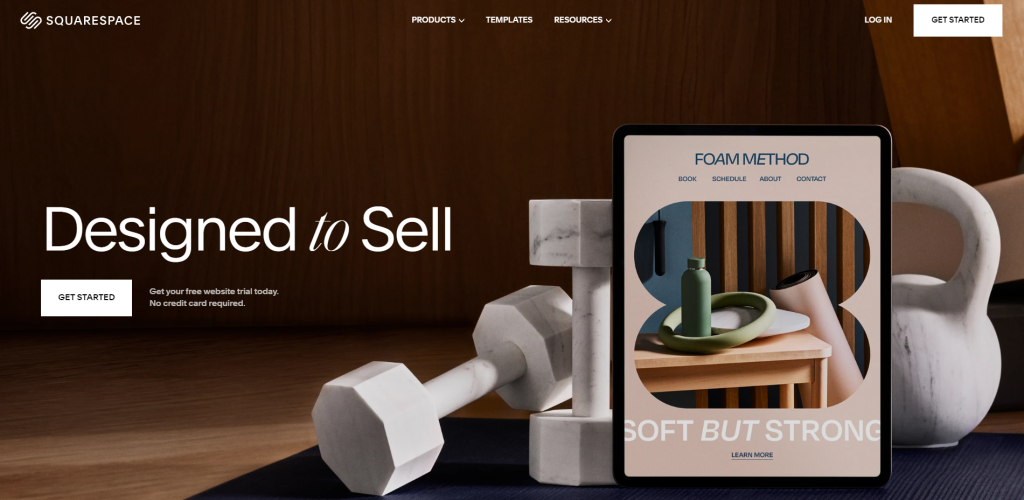
Now, let’s compare Squarespace and Webflow:
| Feature | Squarespace | Webflow |
| Drag-and-Drop Interface | Yes | Yes |
| Template Design | Aesthetic Focus | Professional and Customizable |
| Custom Code Integration | Limited | Extensive |
| E-commerce Capabilities | Robust | Advanced with More Customization |
| Responsive Design | Automatic Adjustment | More Manual Control |
| User Support | 24/7 Customer Support | Extensive, including community forums |
End Thought
After an in-depth exploration of Webflow, it’s evident that this platform excels in advanced web design and development capabilities. Its standout features include a sophisticated visual editor, robust CMS functionality, and comprehensive integration options catering to designers and developers.
The platform’s emphasis on customization and control sets it apart in the market. The review highlights Webflow’s strengths and versatility, though it’s essential to recognize that its advanced features may have a steeper learning curve. Platforms like Wix or Squarespace could be alternatives for those seeking simpler solutions.
Ultimately, Webflow shines for its deep customization and professional-grade tools. As this review reflects, choosing the right web development platform can significantly impact your online presence, and Webflow has firmly established itself as a powerful player in this arena.
Frequently Asked Questions
Is Webflow a good choice for responsive design?
Absolutely, Webflow excels in creating responsive designs that adapt seamlessly to different devices.
What kind of support does Webflow offer?
Webflow provides user support through tutorials, forums, and a responsive customer service team.
How does Webflow’s pricing compare to other tools?
Webflow offers competitive pricing, with plans varying based on hosting needs and design capabilities.
- 5 Best DevOps Platform and Their Detailed Guide For 2024 - December 26, 2025
- Top 10 Cross Browser Testing Tools: The Best Choices for 2024 - October 28, 2025
- 5 Best API Testing Tools: Your Ultimate Guide for 2024 - October 26, 2025
